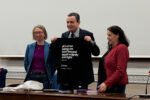Vukashin Milicevic, a Serbian theologian, priest, and former professor, has spoken about the role and influence of religion in social and political relations in the Balkans. He stated that the Serbian Orthodox Church has played a significant role in the context of war crimes and historical manipulation. According to him, this church is involved in an effort to brutally revise what happened in Srebrenica, portraying Serbia as a victim.
“If the church’s stance on the issue of war crimes had been consistent, then one could imagine a situation where such a stance might make sense. If their stance on their legacy had been consistent, then their intervention and agitation against the canonization of Stepinac would have been completely justified. This way it would be justified, but it would carry an entirely different weight, a different foundation, and this brings us back to the history of accepting responsibility and repentance.”
Regarding the Srebrenica Resolution, he says that one of the main axes of nationalist manipulation is the discourse of self-victimization.
“It’s a picture that can be applied across the former Yugoslavia, but I will speak only about the Serbian Orthodox Church, although all communities act the same. There is a terrible, morally scandalous manipulation regarding the genocide in Srebrenica. The church is involved in an effort for a brutal revision of what happened, which is known based on thousands of pages. Although it is declaratively stated that we respect the victims of others, everything we do shows that we do not respect them and that we relativize the nature of the severe crime that happened there. No one talks about the fact that it’s a manipulation of numbers similar to what Croatian revisionists do when it comes to Serbian victims in World War II,” emphasizes Milicevic.
“Although it is declaratively stated that we respect the victims of others, everything we do actually shows that we do not respect them and that we relativize the nature of the terrible crime that occurred in Srebrenica.”
He adds that, from a biblical perspective, it was fratricide.
“That revisionism not only poisons inter-ethnic relations but, although I dislike saying this, because it’s practically the same nation—without claims of Greater Serbia—we are nations born from an ethnic substrate. It was fratricide, and what was done to the Serbs in the NDH (Independent State of Croatia) and what Bosniaks have gone through is the original sin (Cain and Abel). And anyone who wants to talk about this from a Christian perspective must start from this,” he notes.
During the interview, the Serbian historian also raised the issue of Europe’s relations with Orthodox countries, referring to the feeling rooted in Serbia that “the West will not accept us.”
However, Milicevic emphasized that the biggest problem is that the Balkans does not accept itself as it is.
“It’s one of those general places that represent a meaningless password. If we identify Orthodoxy with Russia, it’s a manipulation. I think the biggest problem is that we don’t love ourselves as we are. We suffer from a higher-value complex which ultimately makes you completely annul yourself. If we look at things on the ground and compare them to any historical period, we have no reason to be a second or third-rate country. Define the place first—when you say Serbia, what do you mean? What is realistic, what doesn’t lead you to crime and destruction for which your descendants will bear the consequences? Here, wounds are not allowed to heal. They dig to mobilize people and they are increasingly fewer. The land, in the physical sense, is being destroyed because there will be no one to work it. These things have nothing to do with a so-called ‘bad’ Europe out there, but with the fact that we have allowed ourselves to take not one step back, but ten steps back when it comes to emancipation and social progress,” says Milicevic.







